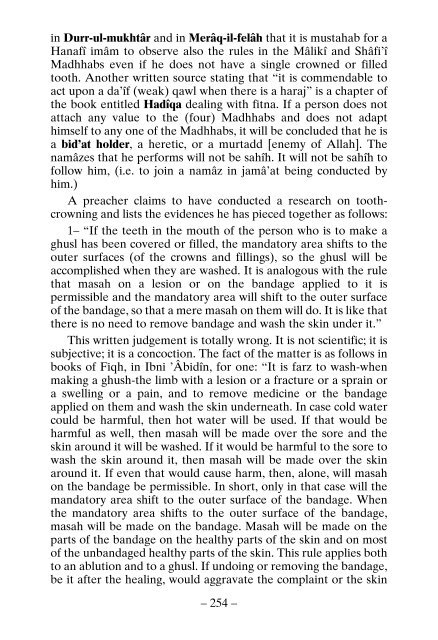O Son !
THE BOOK ‘O SON’ Al-hamdu lillâhi Rabbil ’âlamîn. Wa-s-salâtu wa-s-salâmu ’alâ Rasûlinâ Muhammadin wa Âlihi wa Sahbihi ajma’în. 1– O son! Collecting from books written by the scholars of the Hanafî Madhhab three hundred and sixty hadîth-i-sherîfs and forty-four khabars and also the seven essentials and the five rukns and the seven wâjibs and the fourteen sunnats and the twenty-five mustahabs and the fourteen mufsids of namâz, I have explained them for you. Adapt your acts and deeds to these teachings so that you attain fayz and nejât (salvation)! 2– Also for your information, I have collected a thousand and ninety âdâb (adabs) for you and for other young Muslims like you. If you adapt your actions and acts of worship to these teachings, they will be sufficient for you. If you laze, disobey Allâhu ta’âlâ and cease from these practices and manners, you will be afflicted with slavery and disgrace in the world and subjected to torment in the world to come. If you live up to them and advise your Muslim brothers to do the same, it will be useful for you. They will say blessings over you. And Haqq ta’âlâ will accept their invocations. For, a slave will be pardoned on account of another slave’s invocations for them.
THE BOOK ‘O SON’
Al-hamdu lillâhi Rabbil ’âlamîn. Wa-s-salâtu wa-s-salâmu ’alâ
Rasûlinâ Muhammadin wa Âlihi wa Sahbihi ajma’în.
1– O son! Collecting from books written by the scholars of the
Hanafî Madhhab three hundred and sixty hadîth-i-sherîfs and
forty-four khabars and also the seven essentials and the five rukns
and the seven wâjibs and the fourteen sunnats and the twenty-five
mustahabs and the fourteen mufsids of namâz, I have explained
them for you. Adapt your acts and deeds to these teachings so that
you attain fayz and nejât (salvation)!
2– Also for your information, I have collected a thousand and
ninety âdâb (adabs) for you and for other young Muslims like you.
If you adapt your actions and acts of worship to these teachings,
they will be sufficient for you. If you laze, disobey Allâhu ta’âlâ
and cease from these practices and manners, you will be afflicted
with slavery and disgrace in the world and subjected to torment in
the world to come.
If you live up to them and advise your Muslim brothers to do
the same, it will be useful for you. They will say blessings over you.
And Haqq ta’âlâ will accept their invocations. For, a slave will be
pardoned on account of another slave’s invocations for them.
You also want an ePaper? Increase the reach of your titles
YUMPU automatically turns print PDFs into web optimized ePapers that Google loves.
in Durr-ul-mukhtâr and in Merâq-il-felâh that it is mustahab for a<br />
Hanafî imâm to observe also the rules in the Mâlikî and Shâfi’î<br />
Madhhabs even if he does not have a single crowned or filled<br />
tooth. Another written source stating that “it is commendable to<br />
act upon a da’îf (weak) qawl when there is a haraj” is a chapter of<br />
the book entitled Hadîqa dealing with fitna. If a person does not<br />
attach any value to the (four) Madhhabs and does not adapt<br />
himself to any one of the Madhhabs, it will be concluded that he is<br />
a bid’at holder, a heretic, or a murtadd [enemy of Allah]. The<br />
namâzes that he performs will not be sahîh. It will not be sahîh to<br />
follow him, (i.e. to join a namâz in jamâ’at being conducted by<br />
him.)<br />
A preacher claims to have conducted a research on toothcrowning<br />
and lists the evidences he has pieced together as follows:<br />
1– “If the teeth in the mouth of the person who is to make a<br />
ghusl has been covered or filled, the mandatory area shifts to the<br />
outer surfaces (of the crowns and fillings), so the ghusl will be<br />
accomplished when they are washed. It is analogous with the rule<br />
that masah on a lesion or on the bandage applied to it is<br />
permissible and the mandatory area will shift to the outer surface<br />
of the bandage, so that a mere masah on them will do. It is like that<br />
there is no need to remove bandage and wash the skin under it.”<br />
This written judgement is totally wrong. It is not scientific; it is<br />
subjective; it is a concoction. The fact of the matter is as follows in<br />
books of Fiqh, in Ibni ’Âbidîn, for one: “It is farz to wash-when<br />
making a ghush-the limb with a lesion or a fracture or a sprain or<br />
a swelling or a pain, and to remove medicine or the bandage<br />
applied on them and wash the skin underneath. In case cold water<br />
could be harmful, then hot water will be used. If that would be<br />
harmful as well, then masah will be made over the sore and the<br />
skin around it will be washed. If it would be harmful to the sore to<br />
wash the skin around it, then masah will be made over the skin<br />
around it. If even that would cause harm, then, alone, will masah<br />
on the bandage be permissible. In short, only in that case will the<br />
mandatory area shift to the outer surface of the bandage. When<br />
the mandatory area shifts to the outer surface of the bandage,<br />
masah will be made on the bandage. Masah will be made on the<br />
parts of the bandage on the healthy parts of the skin and on most<br />
of the unbandaged healthy parts of the skin. This rule applies both<br />
to an ablution and to a ghusl. If undoing or removing the bandage,<br />
be it after the healing, would aggravate the complaint or the skin<br />
– 254 –

















